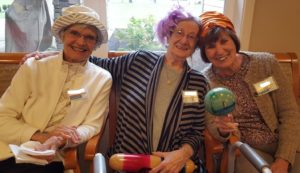Among the most common reasons that people avoid staying in long-term care is the perceived lack of independence.
But in many cases, transitioning from home to long-term care can actually free up a person’s time and energy for the things he or she enjoys most.
Christian Health Care Center in Lynden has a number of programs in place to help residents exercise their independence and participate in meaningful activities, while at the same time receiving the care they need to stay healthy.

CHCC’s resident council helps the facility’s long-term residents participate in how things are run. Once a month, the council gathers to discuss how life is going for the center’s long-term residents. They are integral to the skilled health care center’s operations — and they make a difference. Recent discussions about the menu’s dietary options, for example, led to a new omelet cart being available to residents each week. And when residents advocated for more mentally stimulating games, such as Jeopardy, Wheel of Fortune, trivia and brain teasers, new games were added to the monthly activity schedule.
The variety of activities available at CHCC offer residents the freedom to be involved as much or as little as they want. At home, it can be difficult to remain active; often it takes special appointments with family or other caregivers. But at CHCC, an ample selection of activities takes place every single day, and residents can choose whether and how much to participate. Positive, engaged interactions are important to maintaining and even improving health and well-being, and skilled health care facilities like CHCC provide plenty of opportunities for that to happen.

Long-term care facilities such as CHCC also offer meal preparation based on individual residents’ dietary needs. At home, it can be tough for the elderly to get the nutrition they need. Not only would they have to cook, they’d need to shop for the groceries themselves. But at health care centers like CHCC, dietary specialists work diligently to provide the right nutrition for each and every resident. Other services also can free up a resident’s time; the constant availability of medication monitoring and nursing care, for example, means that residents — and their family members — don’t need to worry.
Speaking of family: Long-term care also can increase independence for loved ones, too. Family members who have become caretakers of elderly parents or relatives often find it hard to provide excellent care while caring for themselves at the same time. Often, they think that they’re not doing enough, that they’re having to choose among work, their children and their aging loved ones. Long-term care obviates that struggle, and in a family atmosphere to boot.
The assistance people receive in long-term care allows them to maintain control of their lives while also not having to worry about those things that they may have been struggling with at home.
For information about how long-term care can benefit the loved ones in your life, contact CHCC’s admissions team.
